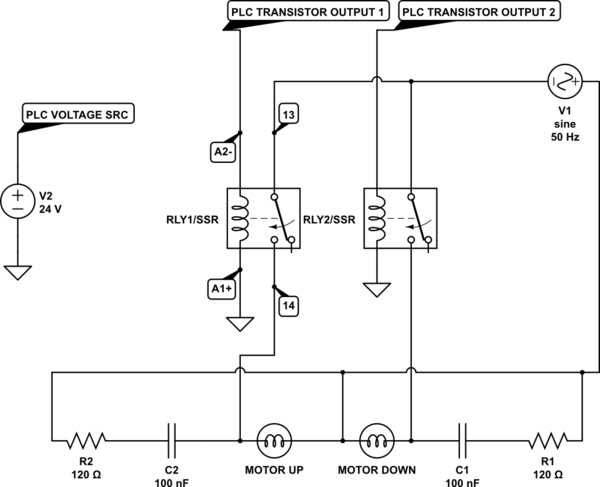I'm having trouble switching an AC motor. Relays spark and glue contacts, and SSRs start to flicker and not pass the full input after a while.
The motor has 3 terminals for 230VAC mains. One is common, one is UP, and the last one is DOWN. common and one of the other ones has to be connected to mains for the motor to move.
The SSRs I tried are rated for 2A 240VAC (FINDER 34.81-8240), use a triac (So inductive kickback should not be a problem), and have zero-crossing turn-on (So inrush current from the motor and it's kickstart capacitor should not matter)
Having ran out of ideas, I tried to switch the SSRs to mechanical relays (rated 8A). Unfortunatelly, they seemed to get stuck after a while. I could see no sparking on closing of the relay, but a massive spark when opening it. (Sometimes, I guess it depended on the phase of current).
So I tried putting 2 RC snubbers (120Ohm, 0.1uF), across UP-common and DOWN-common, parrarel to the motor (To protect two relays), but that didn't seem to change the sparks at all. I also tried putting them across relay contacts themselves. Also had no effect.
I cannot use a bigger relay and would rather not use any unstable components like MOVs, as this setup resides inside walls. I thought of zero-cross current detection for opening the mechanical relays, but apparently they are too slow.
How can I protect the relays/SSRs so that they don't fail?
EDIT: I should also propably mention, that the relays are controlled directly from a PLC's digital output module (Unitronics IO-TO16) connected to A2 on each SSR/relay. The only relevant part of the program, esures that they are never on at the same time. (Though, I didn't really see any damage with stuck relays in such condition). Also, I had some other SSRs, which failed differently. Some would start flickering, but more interestingly, some would work normally themselves, but cause SSRs AND relays NEXT TO them to flicker, as long as they had mains connected to one terminal.

simulate this circuit – Schematic created using CircuitLab
